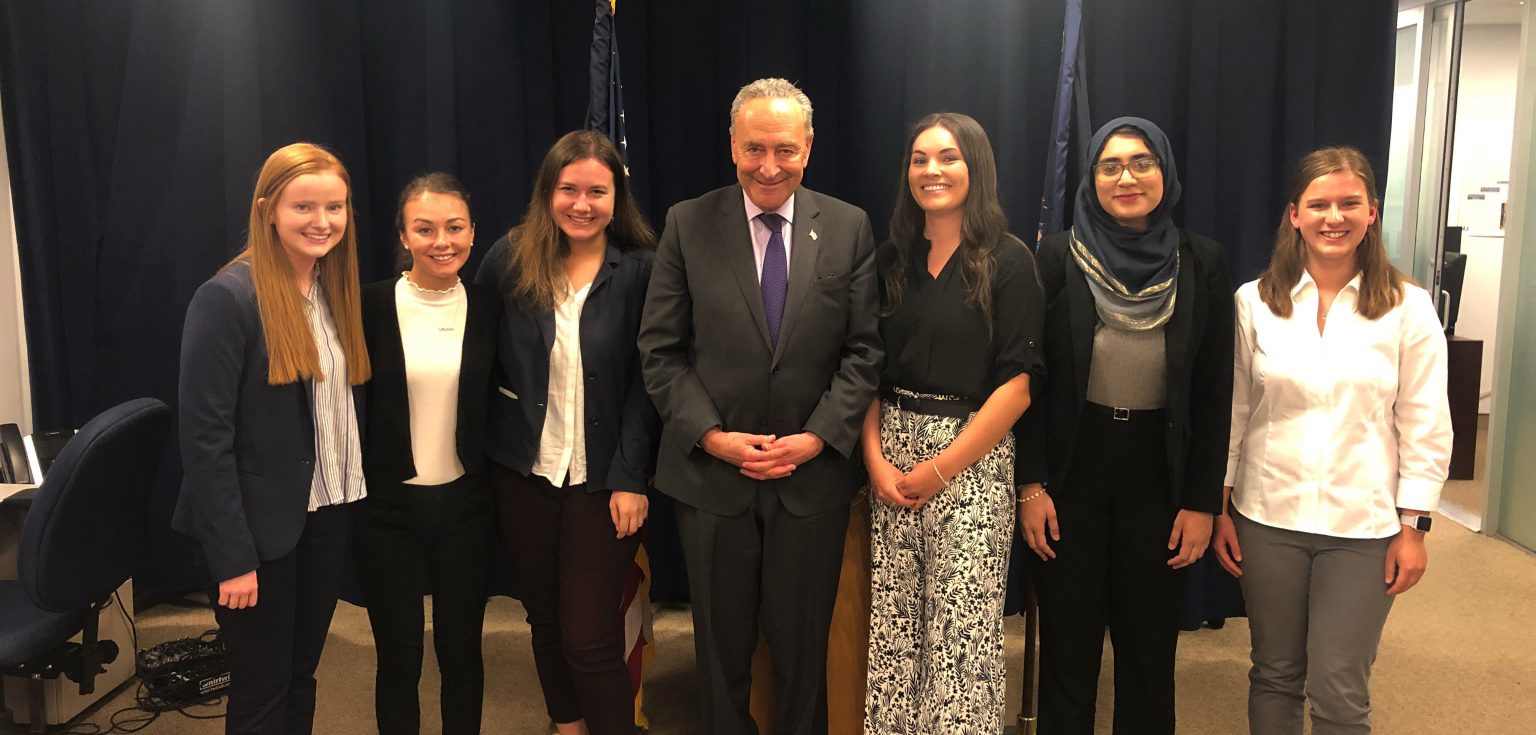Students from a Fordham chapter of a health care advocacy group met with U.S. Senator Chuck Schumer on April 5 to discuss legislation relating to important global health issues, including funding for tuberculosis, AIDS, and addiction treatment.
Fordham News spoke with Marena Casey, senior at Fordham College at Rose Hill and president of the collegiate group, called Partners In Health Engage. The group supports the larger Partners In Health, a nonprofit that aims to provide a preferential option for the poor in health care.
Tell us a little bit about yourself, what you’re studying, and how you came into this work.
I’m double majoring in humanitarian and urban studies and minoring in biology. Next year I’ll be doing the Jesuit Volunteer Corps, working at a Native American health center in Oakland, California.
I want to continue working and learning about public health. Partners In Health has been a great foundation for that, and has really helped me better formulate what I’m passionate about and how I can make an impact.
After [Oakland], hopefully I’ll come back to New York or somewhere on the East Coast to get my master’s in public health.
How did your time at Fordham inspire you to go into public health?
I’ve worked at a few organizations [during my time at Fordham]that have dealt with public health. My first internship was at Maternity Care Coalition. I was a health policy and practice intern there, so I got some exposure to advocacy efforts and also the actual practice of implementing public changes to the health systems there. I worked at Sloan Kettering this past semester in their immigrant health and cancer disparity service, where I was able to work with immigrants who are undergoing active treatment, helping to make sure that their basic needs are met. And I think just being in the Bronx and seeing the health disparities here has been a really important and impactful part of my time here.
How did you decide on which topics to discuss with Senator Schumer?
We talked to Senator Schumer about the following three topics: U.S. Bilateral Tuberculosis Appropriations for fiscal year 2020; the Global Fund to Fight AIDS, Tuberculosis, and Malaria (GFATM) Appropriations for fiscal year 2020; and the Comprehensive Addiction Resources Emergency (CARE) Act.
Those three [pieces of legislation]we chose out of many that Partners In Health feel strongly about, but we felt that those were very important, especially because tuberculosis has been such an issue recently. The CARE Act is a federal policy dealing with the opioid crisis—how do we put policies in place and support local groups that are working on combating the crisis? He expressed his support for that and said he was going to fight for them. And that’s also had such an impact in our community in the Bronx. We really wanted to focus on that too and see what he had to say.
How did your meeting with Senator Schumer go, and what did you think of his answers?
For U.S. Bilateral Tuberculosis Appropriations for fiscal year 2020, we were hoping that he would work to help us increase the appropriations from $319 million that we got in 2019 to $400 million for fiscal year 2020. And similarly, for the Global Fund to Fight AIDS, Tuberculosis, and Malaria, we wanted to increase that funding. The new amount is $1.56 billion for the Global Fund.
A lot of these other meetings have been with just staffers, so being able to actually meet with Senator Schumer was incredible and he really knew his stuff. And he really took the time to listen to us and he was very attentive and answered any questions that we had. I felt that he really would fight as hard as he could for these issues, and he has been such an incredible champion for both global health and federal health care policy in the U.S.
Why should young people care about these issues?
I think young people, especially at Fordham, have so much opportunity to make our voices heard, especially living in New York. And there’s so many great organizations and advocacy efforts to get behind. I think that even if it’s not health that a young person is interested in, any other sector that they feel strongly about, it’s really important to know what policies are in place because it makes such an impact. You can’t really make an impact unless you also try to change the policies that are in place.

